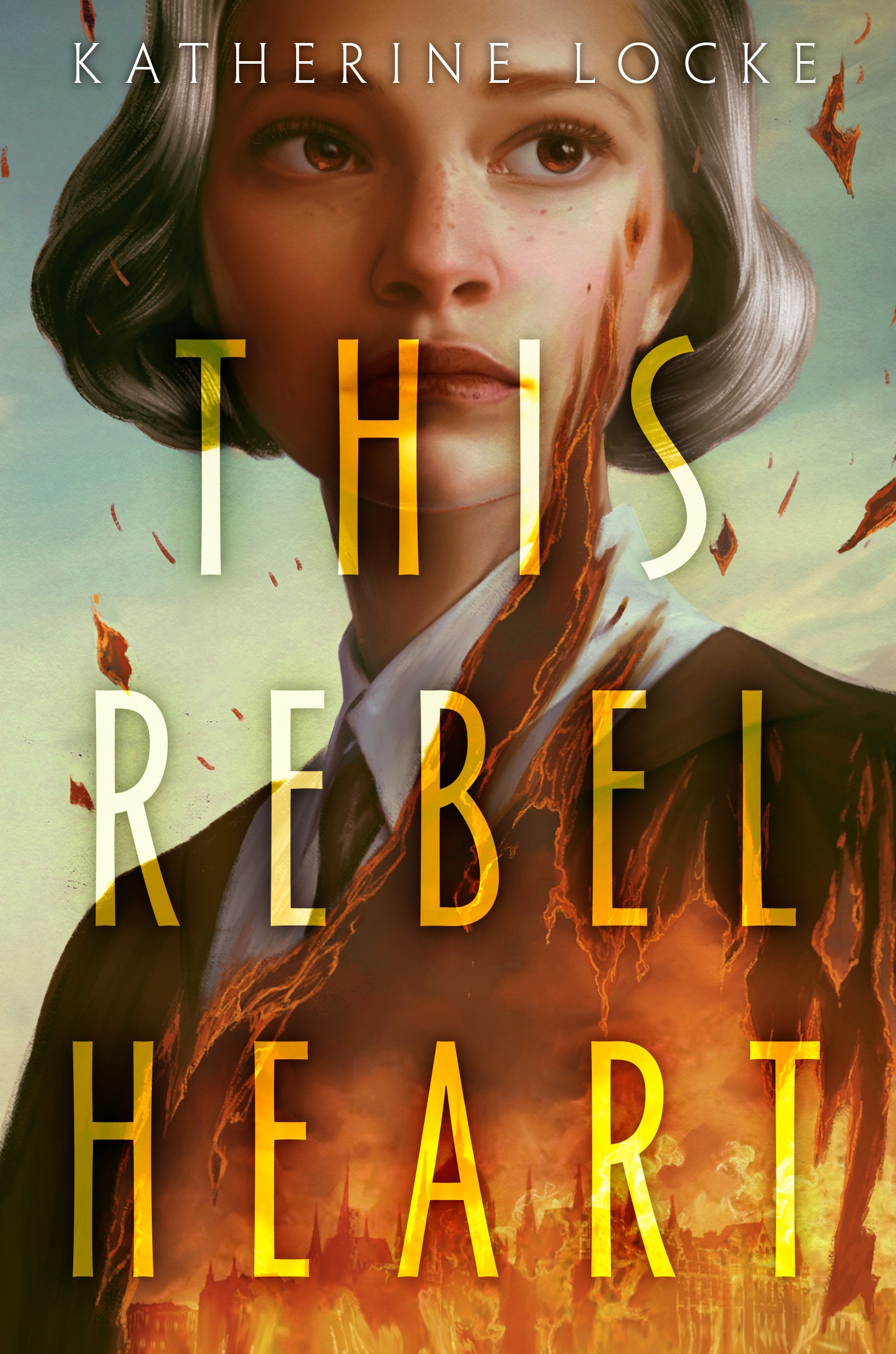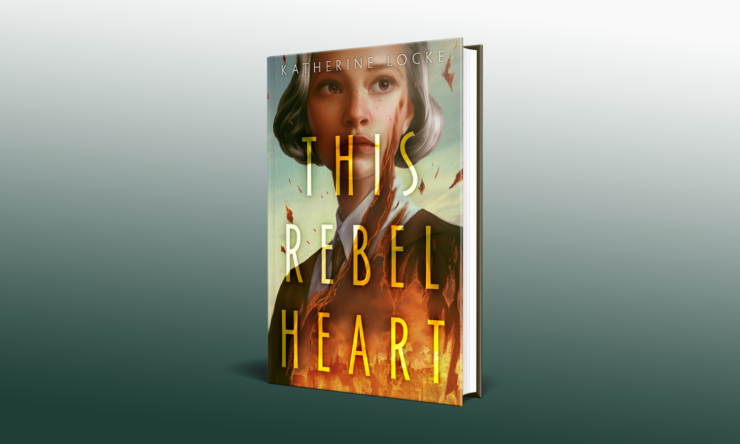In the middle of Budapest, there is a river. Csilla knows the river is magic.
We’re thrilled to share an excerpt from This Rebel Heart by Katherine Locke, an historical fantasy set during the Hungarian revolution in post-WWII Communist Budapest—available now from Knopf Books for Young Readers.
In the middle of Budapest, there is a river. Csilla knows the river is magic. During WWII, the river kept her family safe when they needed it most—safe from the Holocaust. But that was before the Communists seized power. Before her parents were murdered by the Soviet police. Before Csilla knew things about her father’s legacy that she wishes she could forget.
Now Csilla keeps her head down, planning her escape from this country that has never loved her the way she loves it. But her carefully laid plans fall to pieces when her parents are unexpectedly, publicly exonerated. As the protests in other countries spur talk of a larger revolution in Hungary, Csilla must decide if she believes in the promise and magic of her deeply flawed country enough to risk her life to help save it, or if she should let it burn to the ground.
She did not need to be afraid of the dark or anything to come. She need only strike the match.
Her father had said that rivers knew what people did not know. He said, “You must know who you’ve been so you know who you will become.”
And her mother gave her the Hebrew. Ehyeh asher ehyeh. I will be what I will be.
She surfaced from her memories, gasping like she’d just leapt into the river again.
“I have to go,” she said, staggering to her feet, hands against Azriel’s chest.
Buy the Book


This Rebel Heart
“Yes,” agreed Azriel.
“Wait, don’t go,” Tamás said, his voice cracking. “Csilla.” “Give me your newspaper,” Csilla said, already fumbling through the dark for it. She found it, wrapping her hand around it. “Please.”
“Fine,” Tamás said, baffled. He was bewildered, but so was she. She felt a pulse inside her, a decision, an action that she had to take, but she couldn’t explain it to him.
She said to Azriel, “You know how you said you were guided by instinct? This is instinct.”
“Where?” he asked, but she could tell he already suspected the answer.
The mass of people reached the riverbanks where her father once stood, his eyes closed. Did he pray? Did he ask the river to save him? Why couldn’t the river save all of them as it had saved her and her family? Why hadn’t the river saved them when they needed it the most? Why hadn’t her father gone to the river the day he was taken?
Questions for another time.
Csilla reached the stone bank and fell to her knees. She rolled the newspaper into a tube and leaned down, touching it to the water’s surface.
“Ehyeh asher ehyeh,” she whispered to the river. “That’s what you said to me, isn’t it? But you weren’t talking about yourself. You already know who you are. You are a blessing.”
The river warmed against her hand in the cool October night. “You were talking about me,” she kept saying. And then she reached into her memory for a prayer she hadn’t said in years, but she remembered it, her mother’s hands on her hands. “Baruch atah Adonai, Eloheinu melech haolam, shehecheyanu, v’kiy’manu, v’higianu laz’man hazeh.”
The prayer for auspicious beginnings. A prayer of gratitude. Beside her, Azriel murmured, “Amen.”
She sank the newspaper into the river as far as she could, and when she pulled it out, the paper burned like a torch, the flame flickering red and white and orange like a sunset, and it did not go out.
A light in the dark.
A light unto the nations.
She scrambled to her knees and lifted it up, careful not to touch it against anything and extinguish it. She could feel the heat coming off of it and illuminating her face. She stood, shaking, and held it in front of her.
The river whispered to her, Chazak!
But this was not the end of a book; it was a beginning.
Azriel’s face was illuminated, ghostly pale in the flickering light, his dark eyes bright and knowing.
“What now?”
“We go back to Parliament,” she said grimly. She held the burning paper in front of her as she returned to the edge of the crowd. The people parted for her, wide-eyed and solemn. She could feel them filing behind her, instinctively following the light; and the chants, which had disappeared when the lights were cut, rose again, demanding a new prime minister, demanding that Russia leave the country.
As she passed through the crowd, others with newspapers reached out with their rolled-up papers, touching them to her torch. And the flame spread from torch to torch, but it did not burn the paper. No sparks flew from it. It was light, without the danger. It burned fiercely, but it was not destroyed.
And the light spread from one person to the other until there were dots all around her, and just one torch, hers, moved through the crowd with any urgency as she tried to find the front again, where Tamás and Zsu were hopefully still waiting for her. Azriel took her by the hand, and she laced her fingers with his and let him guide her through the crowd, trusting that he knew where he was going.
The light caught Tamás’s face, and he looked at her in disbelief, then at her torch. “Why isn’t it burning down?”
“It is a gift,” Csilla said simply. “From the river.”
Tamás cast his gaze over the crowd, and Csilla turned, looking across the sea of darkness.
The people who touched their light to her light touched lights to each other now, and so the fire spread, torch to torch, a paper for the people, by the people, on fire in the dark. A hundred, five hundred, five thousand, ten thousand, a hundred thousand torches, and the glow lit up the square.
The windows all around them reflected the illuminated torches back at the crowd. Faces, half flame, half shadow, all looking forward and up, determination etched on them.
“What have we done?” Tamás breathed.
And it was bigger than they could have imagined, more people than they could have imagined, and the anger was growing, bubbling over. Csilla knew this feeling now, like they were balancing on the edge of a blade. Another one of Azriel’s turning points.
There was, she realized, no coming back from this. She could not stop what she had set in motion. She could not pull the emergency brake on this train. She could not turn this ship around. No one could, she thought.
It was its own creature. It’d become its own animal.
Then a young man pushed through the crowd, reaching Tamás. He grabbed for Tamás’s arm and shouted something Csilla couldn’t make out. Then Tamás turned to Csilla, grim-faced.
“They’re pulling down the Stalin statue.”
Excerpted from This Rebel Heart, copyright © 2022 by Katherine Locke.










